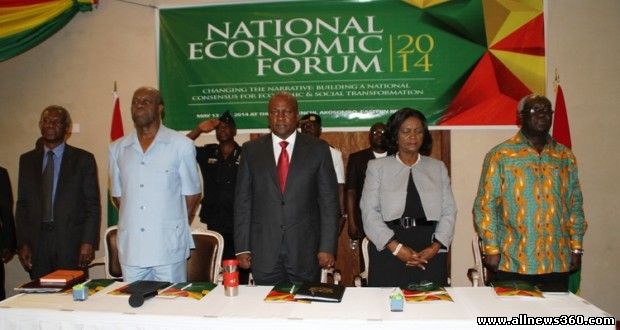 National Economic Forum May 12 – 15, 2014 National Economic Forum May 12 – 15, 2014
The Senchi Consensus
From May 12 – 15, 2014, 140 Ghanaians drawn from organized labour, Ghanaian private sector, professional associations, financial institutions, security services, traditional leaders, political parties, parliamentarians, the clergy, policy think tanks, academia, civil society, and government ministries met in Senchi in the spirit of our shared interest and commitments for Building a National Consensus for Economic and Social Transformation as well as our collective pursuit of inclusive and sustainable development.
We the participants further agreed on the following:
1. That the Directive Principles of State Policy (Chapter 6 of the 1992 Constitution) must continue to guide the national development effort, anchored in a long term national development framework with a compelling vision.
2. That long term national interest should supersede all other interests.
3. That the State encourages and promotes indigenous entrepreneurship and continues to execute projects and programmes commenced by the previous Government.
4. Foster a state whose day-to-day management is supported by a professionally competent civil service working in an environment devoid of political victimization and intimidation and where support for the Government is not interpreted as political affiliation.
5. It is imperative to strengthen the public accounts and finance committees of Parliament to play their oversight responsibilities more effectively; and also to develop a mechanism for effective synergy and coordination between the Monitoring Units of Ministries, Departments and Agencies (MDAs), the National Development Planning Commission (NDPC) and the Office of the President.
6. That a mechanism to effectively monitor, evaluate and reform the use of statutory funds transferred to public sector institutions such as the District Assembly Common Fund (DACF), National Health Insurance Authority (NHIA), Ghana Education Trust Fund (GETFUND) must be established.
7. That government should establish a One-Stop-Shop for investments, electronic templates to simplify business processes, streamline the activities of the Ghana Export Promotion Council (GEPC), Ghana Investment Promotion Council (GIPC) and Free zones Board, and strengthen the capacity of the Ghana Statistical Service (GSS) and other statistical reporting agencies to deliver reliable and timely economic and social statistics for planning, research and development.
8. The Ministry of Finance should as a matter of urgency review the targets set in the 2014 budget. The review must identify likely deviations and make proposals for plugging the resultant financing gap while the Bank of Ghana traces the implications of the revisions for monetary policy.
9. That a mechanism must established to realign the budget whenever the economy is affected by unanticipated shocks
10. Government must strengthen the regulatory authorities to protect consumers and ensure the enforcement of standards.
11. Further steps must be taken to support Small-Medium Enterprises (SME) in order to protect jobs.
12. That further efforts must be made to improve the efficiency of tax collection as well as broaden the tax base and reduce recourse to the introduction of new taxes. The incidence of discretionary tax exemptions should be reviewed and reduced.
13. Bank of Ghana should expedite work on the assessment of the recently announced foreign exchange measures and take speedy and appropriate action to restore confidence and relieve the unintended consequences of the measures.
14. Consideration should be given to the amendment of the Bank of Ghana Act to set a ceiling on its lending to government that is based on government’s revenue collection in the previous year, rather than the current year as is currently that case. This should be separated from the ceiling on total net domestic borrowing by government.
15. An investment programme to deal with the energy crisis must be put in place as a matter of urgency in order to propel growth, employment, competitiveness, and macroeconomic stability.
16. That government must take steps to revamp the manufacturing and agriculture sectors to encourage domestic production of some agricultural products as well as import substitutable manufactured goods.
17. Ghana needs accelerated implementation of the current plan to develop the interbank foreign exchange and money markets to ensure active primary and secondary trading.
18. For the purposes of encouraging high national productivity, government, labour and the private sector must collaborate to institute a management and labour productivity crusade including the introduction of a Service Charter that ensures that productivity is matched with remuneration.
19. Take steps to develop long term financing instruments to minimize reliance on short term financing.
20. That a clear and simplified policy framework to help grow and migrate the informal sectors into the formal is urgently required. As such steps must be taken to simplify business registration process, non-mandatory SSNIT contribution up to a minimum number of employees by informal sector operators.
21. We your fellow Ghanaians recognize that socio-economic development is a journey, not a destination. As such, efforts to build a national consensus and long-term plan must also take the mode of a journey. We therefore recommend that the National Economic Forum be institutionalized and that a committee be established to explore various options and model for undertaking this process of institutionalization.
22. Government must take steps to galvanize consensus around other issues of national importance, especially with respect to political governance nation-building matters, and should initiate a process of involving citizens whose experience, insight and expertise will enhance economic policy management and national governance.
A full and detailed report of the proceedings will be made available within few weeks.
Source by: Nana Kesse/AllNews360.com
|

